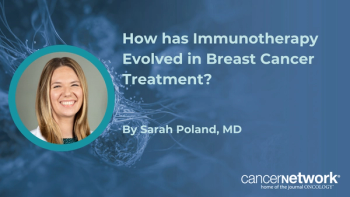
Oncology NEWS International
- Oncology NEWS International Vol 4 No 12
- Volume 4
- Issue 12
Regular Aspirin Use May Lower Breast Cancer Risk
COLUMBUS, Ohio--Women who said they used an NSAID (usually aspirin or ibuprofen) regularly for 5 years or more had a 40% lower risk of breast cancer than those who did not report such use, Dr. Randall E. Harris and his colleagues at the Ohio State University Comprehensive Cancer Center have found.
COLUMBUS, Ohio--Women who said they used an NSAID (usually aspirinor ibuprofen) regularly for 5 years or more had a 40% lower riskof breast cancer than those who did not report such use, Dr. RandallE. Harris and his colleagues at the Ohio State University ComprehensiveCancer Center have found.
This case-control study involved 303 breast cancer patients diagnosedat the University's Arthur G. James Cancer Hospital and 906 controls(women who underwent screening mam-mography and had no detectablebreast disease). Risk factor data were collected by personal interviewsat the time of diagnosis or screening.
Significantly more women in the control group (27%) reported regularNSAID use than did the breast cancer patients (19%). Calculationof odds ratios showed a reduction in risk of 36% for those whotook NSAIDs three or more times a week for 6 months or more, anda reduction of 40% among those who used NSAIDs seven times a weekfor 5 years or more.
These results, published in Oncology Reports (2:591-592, 1995),are supported by an earlier study by Dr. Harris' team that matched744 newly diagnosed breast cancer patients with 767 controls drawnfrom hospital patients with medical conditions unrelated to breastcancer.
That study found a 37% reduction in breast cancer risk among womenwho reported using NSAIDs at least three times a week for at least5 years (Prev Med 24:119-120, 1995).
Articles in this issue
about 30 years ago
Confusion Abounds Over Breast Cancer Risk Factorsabout 30 years ago
Mislocation of BRCA1 Gene Linked to Nonfamilial Breast Cancerabout 30 years ago
Study Probes How Aspirin Decreases Prostaglandin Levelsabout 30 years ago
Scholarships Offered For Palliative Careabout 30 years ago
Rhône-Poulenc Rorer Acquires Applied Immune Sciencesabout 30 years ago
National Breast Cancer Month Spotlights Awareness Effortsabout 30 years ago
Long-term Aspirin Use Reduces Colon Cancer Risk, Study Showsabout 30 years ago
Panel Recommends FDA Approval of First Protease Inhibitorabout 30 years ago
FDA Improves Drug Approval Timesabout 30 years ago
New Strategies Needed to Boost Clinical Trial AccrualsNewsletter
Stay up to date on recent advances in the multidisciplinary approach to cancer.













































